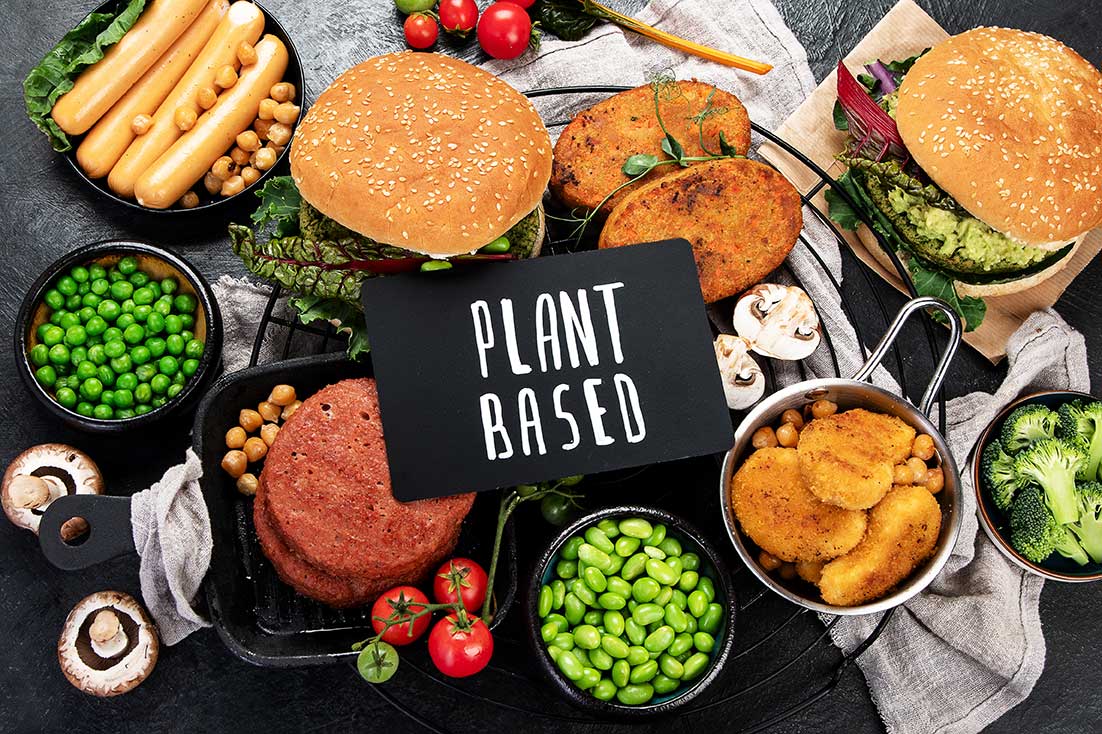A Beginner’s Guide to Cooking With Plant Based Chicken at Home
A Beginner’s Guide to Cooking With Plant Based Chicken at Home
Blog Article
Everything About Healthy And Balanced Food: Advantages of Enjoying Plant Based Options
The conversation bordering plant-based diet plans has actually obtained substantial interest in recent years. Many individuals are exploring the possible wellness advantages, dietary benefits, and ecological influences connected with these dietary choices. As people come to be much more mindful of their food's impact on well-being and sustainability, questions arise concerning the practicalities of embracing such a way of living. What specific changes can one anticipate, and just how might these choices reshape not just personal wellness yet also the world's future?
Recognizing Plant-Based Diet Regimens
Although lots of people connect plant-based diet regimens mostly with vegetarianism or veganism, these diets can include a large range of consuming patterns that focus on entire, minimally refined plant foods. Such diet regimens frequently consist of fruits, vegetables, entire grains, seeds, nuts, and beans, while limiting or getting rid of animal items. This versatility permits people to customize their dietary options according to dietary requirements and individual preferences. Some might take on a largely plant-based diet plan while still periodically consuming meat or milk, usually referred to as a flexitarian approach. The emphasis stays on incorporating more plant foods, which can cause a varied range of tastes and dishes. Recognizing these numerous analyses of plant-based eating is essential for appreciating its availability and charm in modern food society.
Health And Wellness Perks of Plant-Based Foods
The health and wellness benefits of plant-based foods are considerable, using a nutrient density benefit that supports overall wellness. Study indicates that these foods can boost heart health and wellness and play an important function in effective weight administration. By integrating more plant-based alternatives, people may boost their nutritional choices and advertise long-lasting health.
Nutrient Thickness Advantage
Nutrient thickness plays a crucial role in the wellness advantages of plant-based foods, making them a compelling selection for those looking for a well balanced diet. Plant-based foods, such as fruits, vegetables, legumes, nuts, and whole grains, are commonly rich in vital vitamins, minerals, and antioxidants while being lower in calories. This high nutrient thickness enables individuals to take in fewer calories while still meeting their dietary needs. Additionally, these foods are loaded with dietary fiber, advertising digestive health and aiding in weight management. By incorporating nutrient-dense plant-based choices, customers can improve their overall health and wellness, support their body immune systems, and decrease the risk of chronic conditions. Ultimately, the nutrient thickness of plant-based foods underscores their relevance in a health-conscious way of life.
Heart Health Improvement

Weight Monitoring Support
In enhancement to advertising heart wellness, a plant-based diet regimen can substantially aid in weight management. This dietary technique stresses whole foods such as fruits, veggies, vegetables, nuts, and whole grains, which are generally reduced in calories and greater in fiber compared to animal-based products. The high fiber content helps increase satiety, minimizing overall calorie intake. Plant-based diet regimens are often rich in vital nutrients while reduced in unhealthy fats, making it less complicated to maintain a healthy and balanced weight. Research indicates that people that adopt a plant-based way of living often tend to have lower body mass indexes (BMIs) and experience even more successful fat burning compared to those who eat meat-heavy diet regimens. Accepting plant-based choices is a strategic choice for reliable weight administration.
Nutritional Value of Plant-Based Components
Plant-based ingredients are abundant in crucial nutrients, offering a diverse variety of vitamins, minerals, and antioxidants that contribute to total wellness. A contrast of protein sources reveals that while animal items are typically deemed premium, several plant-based options offer adequate healthy protein and various other valuable compounds. Recognizing the nutritional worth of these ingredients can assist people make educated nutritional choices.
Important Nutrients in Plants
Nutrient-rich active ingredients discovered in plants use a diverse selection of vital vitamins and minerals that add considerably to total wellness. These components are rich in vitamins A, C, and K, which support immune function, vision, and blood clot, specifically. On top of that, plants provide vital minerals such as calcium, magnesium, and potassium, important for heart health and wellness, muscle feature, and bone toughness. The visibility of fiber in plant-based foods help food digestion and advertises a healthy and balanced intestine microbiome. Anti-oxidants, located perfectly in fruits and veggies, assistance combat oxidative stress and anxiety and decrease inflammation. Numerous plant foods are reduced in calories yet high in nutrients, making them an excellent choice for those looking for to keep a healthy weight while guaranteeing suitable nutrient intake.

Contrasting Protein Resources
Protein sources differ substantially in their nutritional accounts, with plant-based active ingredients supplying one-of-a-kind benefits. Unlike pet healthy proteins, which often include saturated fats and cholesterol, plant healthy proteins often tend to be reduced in these unhealthy elements. Legumes, nuts, seeds, and whole grains are abundant in vital amino acids, fiber, vitamins, and minerals. As an example, lentils supply high protein web content together with significant iron and folate, while quinoa is a complete healthy protein, supplying all 9 important amino acids. In addition, plant-based healthy proteins are typically come with by anti-oxidants and phytochemicals that support total health. The change to plant-based protein resources not only improves nutritional intake but also straightens with sustainable dietary techniques, minimizing ecological impact and advertising long-lasting health advantages.
Ecological Influence of Plant-Based Eating
As recognition of climate change grows, numerous individuals are checking out sustainable dietary choices that can substantially minimize their environmental footprint. Plant-based consuming has become a significant contributor to lowering greenhouse gas discharges, which are mostly related to animals manufacturing. The farming of fruits, veggies, grains, and vegetables usually requires less resources, such as water and land, contrasted to pet farming. Furthermore, plant-based diet regimens can cause reduced deforestation, as less land is required for grazing livestock or growing animal feed. By changing towards plant-based choices, consumers can support biodiversity and promote much healthier ecosystems. Overall, accepting plant-based eating not only advantages personal health and wellness yet likewise stands for a vital step towards environmental sustainability and preservation initiatives.
Conquering Common Misconceptions
While several individuals identify the advantages of a plant-based diet regimen, a number of misconceptions usually deter them from completely embracing this way of living. A common idea is that plant-based diet regimens lack enough healthy protein; nevertheless, various plant sources, such as beans, nuts, and tofu, provide enough protein. Additionally, some presume that this diet plan is costly, when as a matter of fact, staples like beans, rice, and seasonal vegetables can be rather economical. One more mistaken belief is that plant-based eating is extremely restrictive, whereas it actually supplies a diverse array of foods and tastes. Ultimately, several stress that a plant-based diet plan might bring about shortages, Discover More yet with proper planning, people can get all required nutrients, including minerals and vitamins, while enjoying a variety of scrumptious dishes.
Tips for Transitioning to a Plant-Based Lifestyle
Making the change to a plant-based lifestyle can be an improving experience, though it frequently needs some support to navigate the preliminary modifications. People are motivated to start progressively, incorporating more fruits, veggies, beans, and whole grains into their dishes while decreasing meat and dairy products usage. Dish preparation is necessary; preparing an once a week food selection can assist relieve the change and avoid final undesirable selections. Exploring brand-new dishes and cooking techniques can also improve the experience and preserve enjoyment about plant-based consuming. Furthermore, joining support teams or areas can supply motivation and share useful tips. Lastly, remaining educated about nutrition assurances well balanced dishes, avoiding deficiencies while fostering a healthy my website and balanced, satisfying plant-based way of living.
Delicious Plant-Based Dish Concepts
Checking out scrumptious plant-based meal concepts can inspire people to welcome a more nutritious diet regimen. One preferred choice is a passionate quinoa salad, featuring cherry tomatoes, cucumber, and a zesty lemon-tahini clothing. Another favorite is a tasty lentil stew, packed with carrots, celery, and fragrant natural herbs, excellent for a calming supper. For morning meal, over night oats made with almond milk, chia seeds, and topped with fresh berries offer a nutritious beginning to the day. Additionally, a vivid vegetable stir-fry with tofu and a range of colorful veggies can be a quick yet satisfying dish. Creamy avocado toast on whole-grain bread, sprayed with flavors and seeds, provides a simple yet savory treat. These dishes display the range and richness of plant-based eating.

Frequently Asked Questions
Can a Plant-Based Diet Supply Sufficient Protein?
The question of whether a plant-based diet plan can give sufficient healthy protein prevails. Various resources, including vegetables, nuts, seeds, and whole grains, can fulfill protein requires efficiently, supporting a balanced and nutritious diet for individuals.
Are Plant-Based Diet Plans Suitable for Children?
The viability of plant-based diet regimens for youngsters depends on cautious planning. Adequate nutrients should be ensured, consisting of minerals, vitamins, and healthy proteins. With appropriate guidance, such diet plans can support healthy and balanced over at this website growth and growth in children.
Exactly how Do I Eat Out on a Plant-Based Diet regimen?
Eating in restaurants on a plant-based diet includes seeking dining establishments with varied food selections, requesting for alterations, and discovering vegan-friendly options. Planning ahead and interacting dietary preferences can improve the dining experience while keeping dietary choices.
What Are Common Irritants in Plant-Based Foods?
Typical allergens in plant-based foods consist of soy, gluten, nuts, and seeds - Plant Based Beef. People following a plant-based diet plan ought to understand these allergens and check out labels very carefully to stay clear of negative responses and guarantee secure consumption
Can Plant-Based Diets Assist With Weight Reduction?
Research shows that embracing a plant-based diet plan may promote weight management as a result of its generally lower calorie thickness and greater fiber material. This mix can enhance satiety, aiding people manage their caloric intake effectively. Lots of individuals link plant-based diet plans primarily with vegetarianism or veganism, these diet plans can encompass a wide range of eating patterns that prioritize whole, minimally refined plant foods. Nutrient thickness plays an important role in the health benefits of plant-based foods, making them an engaging choice for those seeking a balanced diet regimen. Plant-based diets have been revealed to markedly improve heart health, as they commonly consist of elements that support cardio feature. In addition to advertising heart health and wellness, a plant-based diet plan can substantially help in weight administration. A common idea is that plant-based diet plans do not have sufficient protein; nevertheless, countless plant sources, such as legumes, nuts, and tofu, provide enough healthy protein.
Report this page